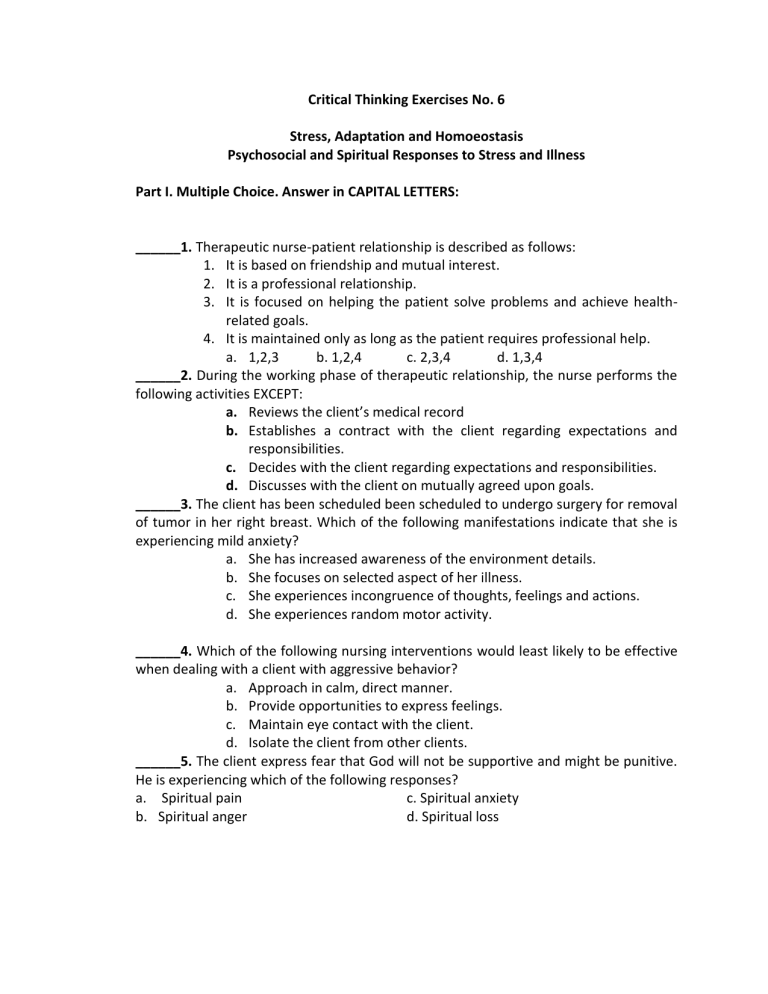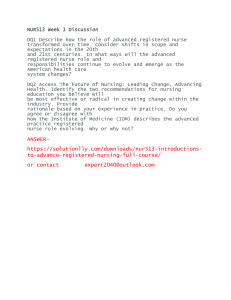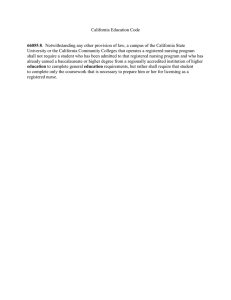Stress, Adaptation & Homeostasis: Critical Thinking Exercises
advertisement

Critical Thinking Exercises No. 6 Stress, Adaptation and Homoeostasis Psychosocial and Spiritual Responses to Stress and Illness Part I. Multiple Choice. Answer in CAPITAL LETTERS: ______1. Therapeutic nurse-patient relationship is described as follows: 1. It is based on friendship and mutual interest. 2. It is a professional relationship. 3. It is focused on helping the patient solve problems and achieve healthrelated goals. 4. It is maintained only as long as the patient requires professional help. a. 1,2,3 b. 1,2,4 c. 2,3,4 d. 1,3,4 ______2. During the working phase of therapeutic relationship, the nurse performs the following activities EXCEPT: a. Reviews the client’s medical record b. Establishes a contract with the client regarding expectations and responsibilities. c. Decides with the client regarding expectations and responsibilities. d. Discusses with the client on mutually agreed upon goals. ______3. The client has been scheduled been scheduled to undergo surgery for removal of tumor in her right breast. Which of the following manifestations indicate that she is experiencing mild anxiety? a. She has increased awareness of the environment details. b. She focuses on selected aspect of her illness. c. She experiences incongruence of thoughts, feelings and actions. d. She experiences random motor activity. ______4. Which of the following nursing interventions would least likely to be effective when dealing with a client with aggressive behavior? a. Approach in calm, direct manner. b. Provide opportunities to express feelings. c. Maintain eye contact with the client. d. Isolate the client from other clients. ______5. The client express fear that God will not be supportive and might be punitive. He is experiencing which of the following responses? a. Spiritual pain c. Spiritual anxiety b. Spiritual anger d. Spiritual loss ______6. The client verbalizes, “I’m nothing.” Which of the following is the most appropriate response by the nurse? a. “Are you suggesting that you feel worthless?” b. “Of course, you’re everything.” c. “That’s not true.” d. “You should not feel that way.” ______7. The client verbalizes that he is very anxious that the diagnostic tests he had undergone might reveal he has cancer. Which of the following is most appropriate nursing intervention? a. Tell the client not to worry unnecessarily, until the results are in. b. Ask the client to express feelings and concerns with regards to outcome of the tests. c. Reassure the client that everything will be alright. d. Advise the client to divert his attention by watching television or reading newspaper. Part II. Matching Type. Answer in CAPITAL LETTERS. ______8. The adolescent decides to take up nursing because she greatly admires her mother who is a nurse. ______9. The girl who is not beautiful as her sisters, studies very hard and she achieves high grades in school. ______10.The teacher who really wants to be principal of the school states that she wouldn’t take the position if it were offered because it is a lot work and no commensurate compensation. A. Compensation B. Reaction Formation C. Regression D. Identification E. Denial F. Conversion G. Rationalization H. Displacement ______11. The father shouts at his children as he arrives home because he was reprimanded by his boss, at work. ______12.The six year old child thumbsucks as he is confined in the hospital. ______13. The nursing student vomits after a difficult examination. ______14.The client with cancer consults to other physicians because he refuses to accept the diagnosis by his attending physician ______15. The student who hates her teacher, frequently tells the teacher that she admires her teaching. Part III. Essay (15 points) In 15 sentences, describe a crisis that you have experienced, its effects in your life, the coping mechanism that you have utilized.



